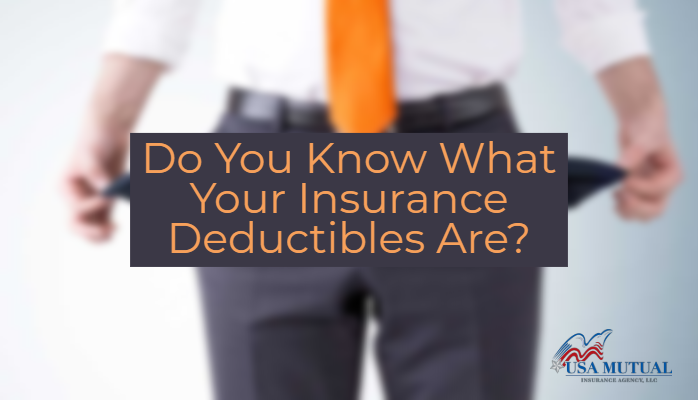|
If you are a business owner, you know a thing or two about taking risks. Your entrepreneurial spirit is not only commendable, it’s critical to keeping our economy going. But at the same time, it’s smart business to limit your risks however and wherever you can. That’s where business insurance—and solid advice from USA Mutual Insurance come into play.
Is business insurance necessary? The short answer is absolutely. Especially if you have employees, in which case some types of insurance, including workers’ compensation and disability insurance, may be required by law. You may also be required to have insurance if you have a company car. In other instances, insurance coverage can be a stipulation of getting a business loan, lease, supplier or customer contract or a state or local business license. In many cases, though, there are no laws, rules or regulations that mandate business owners make smart choices about protecting their business. As a result, around 40% of small businesses don’t have insurance. What’s the risk? Many small businesses go without insurance because of the cost. But those businesses haven’t carefully considered what not having insurance could cost them. The reality is, all businesses face risks that could be financially devastating without insurance protection. Obviously if you’re opening a skydiving school, your business risks are going to be a lot more substantial than if you’re opening up a bookstore. But no business is entirely immune to risks, which could include:
Tips for protecting your business If you don’t want all the hard work that goes into starting a business to be in vain, make sure your business is covered. Keeping these tips in mind can help you secure the right insurance for your company: 1. Make the right call. Trying to understand your insurance needs and which coverage are the right fit can be overwhelming, if not downright impossible, to do on your own. So don’t go it alone. Call your independent insurance agent. Independent insurance agents are not only well-versed in the types of risks businesses face, they also know the types of insurance products available to protect businesses, and they represent multiple insurance companies, which means they have access to a wide range of products to choose from.. An independent agent can help you carefully consider and identify potential risks to the business and fully explore your insurance options, so that coverage can be matched to your unique needs. Essentially, working with an agent ensures you get the expert help and advice you need to make sure your business is covered, no matter what happens. 2. Plan on it. Create a detailed business plan that outlines what the business will do and how it will do it. A solid business plan is a crucial tool when it comes to securing insurance as well as funding for a new business. A plan demonstrates to insurance underwriters and potential investors that you’ve done your due diligence to consider the risks you may encounter and how to protect your business as it grows. Your independent agent can help you create a good plan and pitch it to insurance underwriters. 3. Know your risks. There are many, many types of commercial insurance products on the market, ranging from general liability insurance, to property coverage, to commercial automobile coverage, to data breach and e-commerce coverage. Knowing what protection you need starts with understanding the unique risks your business faces. For example, if you’re starting a contracting business or a manufacturing company, equipment breakdown or electrical failure could seriously jeopardize your livelihood. On the other hand, if you’re launching an e-commerce site, protection against data compromise is probably a must. An independent agent can help you identify your potential liabilities and risks via a professional risk assessment so you know what types of coverage you need. 4. Consider a package deal. If your business requires a number of different types of coverage—such as property coverage, vehicle coverage, protection from business interruptions or loss of equipment and liability coverage—you may want to consider a Business Owner’s Policy (BOP). A BOP bundles different types of coverage together and can save you money versus buying separate policies for your various insurance needs. 5. Make it personal. Your business is unique, and that means your insurance coverage should be too. Even if a BOP makes sense for you, you should talk to your independent agent about customizing the coverage so you have added protection where you need it most. Your agent can help you look at adding endorsements or other options to your coverage based on your business’s specific needs and risks. Keep in mind that independent agents typically have access to a multiple carriers, so they’re very well equipped to deliver the customized insurance options you need. 6. Make no mistake. Owners of home-based and small businesses frequently make two common insurance mistakes. First, home-based business owners often assume their homeowner’s policy covers business assets. But in most cases, you need a separate commercial policy to safeguard business property and protect your business from liability. Second, owners who have incorporated or formed an LLC may think their business structure protects them. While a formal business structure may protect your personal assets, it won’t cover business losses. 7. Don’t overdo it. While protecting your business with insurance is no doubt a smart investment, no owner wants to pay for coverage he or she doesn’t need. Working closely with your independent agent and ensuring he or she truly understands your business can help prevent buying unnecessary coverage. You can also save money by choosing a higher deductible and following your insurer’s recommendations for avoiding loss. 8. Take a second look. As your business evolves, so will your risks. It’s a good idea to review your insurance policies with your independent agent at least two times each year to identify new risks and ensure you have the coverage you need to protect your company and your livelihood for the long term. If you are a small business owner and would like to explore who to protect your business with insurance, click here to speak with one of our insurance professionals. Source: https://www.grangeinsurance.com
0 Comments
Insurance policies typically come with a deductible -- an amount you must pay before your coverage kicks in. For example, if you have a $500 deductible on your homeowners insurance and a tree falls on your house requiring repairs, you'd pay $500 of the cost, and the insurer would pay any additional expenses for covered repairs up to policy limits.
With some types of policies, such as home and auto insurance, you usually can set your deductible. For other policies, such as health insurance, the deductible is fixed, so you'd need to pick a policy with a deductible you can afford. Since you're responsible for the deductible when you need covered services, it's important you always consider how much of a deductible is right for you. Here are some tips to decide: 1. Understand the relationship between deductibles and premiums While most people would naturally like a lower deductible because that means paying less money out of pocket if a problem arises, lower deductibles come at an added cost. If you reduce the deductible on your insurance, or if you pick a health insurance policy with a lower deductible, premiums tend to be higher. Premiums, or the monthly cost you pay for a policy, are fixed and predictable costs you have to pay to stay covered regardless of whether you end up making an insurance claim or not. Some people would prefer to pay higher premiums all the time for the peace of mind that comes with knowing they don't have to pay much out of pocket when a problem arises. But this isn't always the right choice. For example, if raising your auto insurance deductible from $500 to $1,000 would save you about 10% in premium costs, and you're currently paying $900 per year for car insurance, you'd likely save around $90 annually by raising your deductible. If you put this money into a savings account, you'd be able to save up the extra $500 to cover the higher deductible in about 5 1/2 years. If you didn't get into a car accident in that time, you'd be better off. You could keep that money saved in case of an accident and continue to benefit from paying $90 less each year for insurance. Of course, if you did have a collision during those 5 1/2 years and had to pay $500 for repairs, you'd end up worse off with larger total out-of-pocket costs than if you'd paid for the more expensive policy. 2. Consider the likelihood you'll need to make an insurance claim With some types of insurance, you can't really predict when you're going to need to make an insurance claim. It's hard to know, for example, when your car might be stolen or if someone might break into your house next year. But when buying health insurance, there are times when you'll know if you're going to need more coverage. If you're going to have a baby next year, if you have a chronic condition that requires regular doctor visits, or if you have an operation planned, then you know you're going to use your insurance. If that's the case, you'll probably benefit from getting a policy with a lower deductible. But if you have no medical issues, are young and healthy, and almost never go to the doctor, you may decide to gamble on a policy with a higher deductible and lower premiums under the assumption you probably won't actually need your insurer to pay for much care. 3. Know what's covered outside of the deductible With some policies, you get full coverage for certain types of services before you've met your deductible. With car insurance, for example, you may be able to get your windshield repaired without incurring any costs, even if your deductible for collision or liability coverage hasn't been met. With health insurance, you can usually get preventive care and screening at no cost even if you haven't yet met your deductible. Knowing what coverage you have before meeting the deductible will help you to assess the likelihood you'll need to pay out of pocket for services. 4. Assess your savings rate to make sure you can cover your deductible Be sure you have the money available to cover your deductible if something happens. If you have a $2,000 deductible and have $2,000 in an emergency fund or in a health savings account, you don't need to worry much if you must go to the doctor or if something happens to your car or house. But if you have $0 saved, you could be in trouble if you end up covering a hefty deductible -- especially as you usually need to come up with the money right away if you get sick or your car or house needs repairs. If you'd end up relying on high-interest debt to cover costs with a high deductible policy, you may be better off paying a little more for premiums so you don't have to worry about this happening. You can then work on saving to cover your deductible and change your policy once you have the extra cash in the bank for what you need if something goes wrong. 5. Don't get the wrong insurance coverage Insurance is supposed to protect you from unexpected costs and ensure you can cover essential expenses when something goes wrong. Now you know how to adjust your deductibles so you can fully benefit from this protection without spending for coverage you don't really need. The key: Find a policy that's a good fit. If you have any questions regarding any of our insurance policies and would like one of our insurance professionals to review your policy and deductions with you, click here to make any appointment. Source: fool.com |
Archives
February 2022
Categories |
USA Mutual Insurance Agency, LLC | 4830 Arthur Kill Road, LL1 Staten Island, NY 10309 | (718) 285-6500 | [email protected]



 RSS Feed
RSS Feed